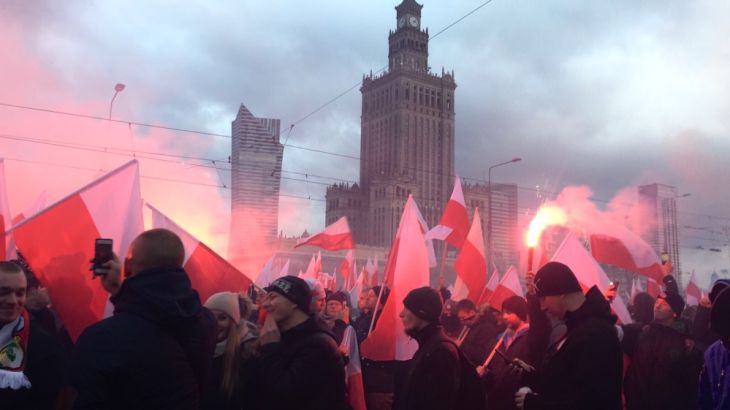Thousands of nationalists, fascists march in Warsaw
Annual ‘Independence March’ sees protesters from Europe rally against Islam and EU to reassert nationalist sentiment.

Thousands of nationalists and fascists gathered in Warsaw on Saturday to attend an annual “Independence March” under the banner: “We Want God”.
The rally, which began at 3pm (14:00 GMT) local time, coincides with Poland’s independence day on November 11.
Keep reading
list of 4 itemsGermany’s Scholz calls for unity against far-right after MEP seriously hurt
‘No turning back’: Carnation Revolution divides Portugal again, 50 years on
Active Clubs: A new far-right threat to democratic elections
According to the organisers, the event is the biggest “patriotic” gathering of its kind in Europe.
“We expect something like 100,000 people to attend this year,” said Al Jazeera’s David Chater, reporting from Warsaw.
Organisers later claimed the number had exceeded that estimate.
Some of the chants early on in the day included: “Great national Poland, religion is the basis of the Polish nation, Great Catholic Poland and one nation across the borders”.
Later chants directed expletives at refugees, leftists, liberal media outlers, and the US.
A countermarch organised by Antifa Warsaw drew around 5,000 participants, according to lidia Domanska, one of those involved.
She said it was the biggest anti-fascist demonstration on the Independence Day in recent years and had passed without incident.
Having launched as a smaller gathering in 2009, it now draws tens of thousands of supporters, including many from neighbouring countries.
Since 2012, a group of sympathisers known as the march guard was recruited to provide security.
Many of the attendees are young nationalists, who protest against Islam and the EU.
![The march tends to draw tens of thousands of nationalists [Agnieszka Pikulicka-Wilczewska/Al Jazeera]](/wp-content/uploads/2017/11/77e889ba297b49f285e2bf56dd5e4f5b_18.jpeg)
The rally’s popularity demonstrates the deepening divisions within the Poland’s divided society.
Agata Szczesniak, a member of the independent investigative journalist unit Oko Press, told Al Jazeera: “These people are angry, they are frustrated they are blaming Muslims which are not present in Poland almost at all.
“They are also blaming liberal European elites for the failures of the state.
“They are strongly anti-refugee and anti-immigrant, and strongly nationalist.”
Angelika, a 21-year-old at the march, told Al Jazeera: “To me, November 11 is the most important day in the calendar. On this day, Poland regained independence.
“If not for the fight and persistence of our people, we wouldn’t be here today. In the memory of those who fought for our country, I participate in the march each year.”
Alexandra, a 30-year-old in Warsaw, said she was worried about the increase in the number of young people attending far-right events.
“I’m saddened by the fact that in recent years Independence Day has become an occasion for violent clashes and the promotion of far-right views,” she told Al Jazeera.
“What is also worrying is that in comparison to previous years, I can see a lot of very young people, who are a fertile ground for the easy solutions offered by the nationalists,” she added.
‘We Want God’
The slogan “We Want God” aims to remind that Poland is still the bastion of faith and religiosity in Europe, organisers have claimed.
The chairman of the Independence March association, Robert Bakiewicz, said during a recent press conference that the protesters want to confront atheist Europe and respond to the “invasion of immigrants”.
“We are recalling the fighting church, which for centuries was the keystone and fundament of Europe”, he said. “We want to show Catholicism not as a faith of weakness, but as a faith of strong people”.
Beata Szydlo, current prime minister, leads the right-wing populist Law and Justice party. On Thursday, she told a conference in Warsaw that Poland was “in favour of an EU where Christian traditions are not censorship”.
Poland has refused to take in refugees, with officials claiming that people of Muslim background are a threat to security. Fewer than one percent of the Polish population is Muslim.
![Since 2012, a group of sympathisers known as the march guard was recruited to provide security [Agnieszka Pikulicka-Wilczewska/Al Jazeera]](/wp-content/uploads/2017/11/abc315a8fbc64e6ea1f607272d380a62_18.jpeg)
The Independence March often ends in clashes between protesters and police, but the level of violence has fallen over the past two years, perhaps as a result of the Law and Justice’s election victory.
In a statement on its website, organsiers said protesters were banned from marching under the influence of alcohol as they warned people to “behave appropriately”.
"We want God" is the slogan of this year's #IndependenceMarch in #Poland. Polish #nationalist are chanting "Great Catholic Poland" #MarszNiepodległości2017 pic.twitter.com/qhHACEpzpt
— Agnieszka Pikulicka (@Aga_Pik) November 11, 2017
Elsewhere, on Friday, the far-right All-Polish Youth and National Radical Camp groups held a conference focusing on “the vision after the collapse of the West, that is, the old world in the post-European Union era … social and economic changes and the shock of the future”.
Richard Spencer, a well-known American white supremacist, had been slated to attend but was removed from the agenda.
It was unclear whether the Polish government blocked his attendance, but Foreign Minister Witold Waszczykowski warned on Friday that the self-described “white Zionist” should not appear publicly in the Eastern European country, especially given his views on the Holocaust. Spencer has previously been accused of anti-Semitism.
With reporting by Agnieszka Pikulicka-Wilczewska in Warsaw: @Aga_Pik
![A banner depicting a refugee as a suicide bomber on board a trojan horse [Agnieszka Pikulicka-Wilczewska/Al Jazeera]](/wp-content/uploads/2017/11/8453407e341a4716ae71fd018b112c2e_18.jpeg)